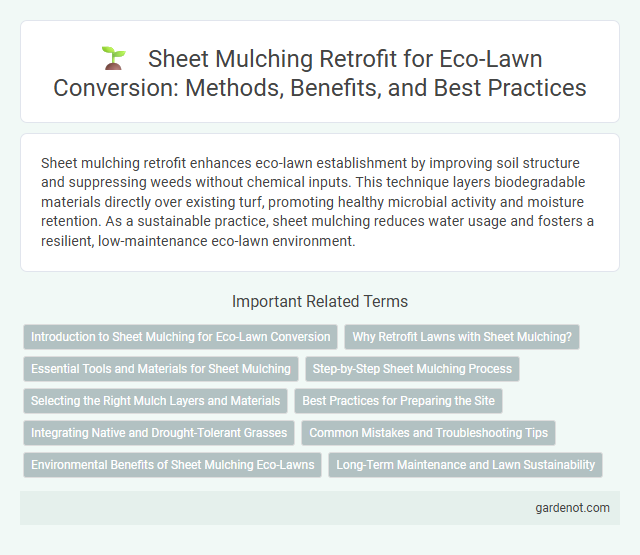Sheet mulching retrofit enhances eco-lawn establishment by improving soil structure and suppressing weeds without chemical inputs. This technique layers biodegradable materials directly over existing turf, promoting healthy microbial activity and moisture retention. As a sustainable practice, sheet mulching reduces water usage and fosters a resilient, low-maintenance eco-lawn environment.
Introduction to Sheet Mulching for Eco-Lawn Conversion
Sheet mulching for eco-lawn conversion enhances soil health by layering organic materials such as cardboard, compost, and mulch directly over existing turf. This no-dig method suppresses weeds, improves moisture retention, and enriches the soil microbiome, creating ideal conditions for native grasses and drought-resistant plants. Incorporating sheet mulching accelerates sustainable lawn transformation while reducing water consumption and chemical inputs.
Why Retrofit Lawns with Sheet Mulching?
Retrofit lawns with sheet mulching to enhance soil health by suppressing weeds and improving moisture retention, which reduces the need for chemical fertilizers and frequent watering. This eco-friendly method fosters beneficial microbial activity, accelerates organic matter decomposition, and creates a nutrient-rich growing environment. Implementing sheet mulching in lawn renovation promotes sustainable landscaping by reducing maintenance costs and minimizing environmental impact.
Essential Tools and Materials for Sheet Mulching
Essential tools for sheet mulching retrofits include a flat-edged shovel, garden fork, utility knife, and garden gloves to prepare and handle materials effectively. Key materials encompass layers of cardboard or newspaper for weed suppression, nitrogen-rich organic matter like compost or manure to enrich soil, and a thick layer of mulch such as wood chips or straw to retain moisture and suppress weeds. Using these tools and materials ensures a successful eco-lawn retrofit by promoting soil health and sustainable weed management.
Step-by-Step Sheet Mulching Process
Sheet mulching retrofit involves layering organic materials to transform existing turf into a healthy eco-lawn by suppressing weeds and enriching soil. Start by mowing the lawn short, then apply cardboard or newspaper sheets as a weed barrier, ensuring overlaps to block sunlight effectively. Top this with a mix of compost, mulch, and soil amendments to promote microbial activity and plant growth, allowing several months for natural soil improvement before planting.
Selecting the Right Mulch Layers and Materials
Selecting the right mulch layers and materials for a sheet mulching retrofit is crucial for establishing a healthy eco-lawn that promotes soil fertility and moisture retention. Organic materials like cardboard or newspaper as the base layer suppress weeds effectively, while subsequent layers of compost and shredded mulch enhance microbial activity and provide essential nutrients. Proper thickness and layering techniques ensure optimal aeration, water infiltration, and weed control, supporting sustainable lawn regeneration.
Best Practices for Preparing the Site
Sheet mulching retrofit for eco-lawn preparation requires thorough site assessment to identify existing vegetation and soil conditions. Best practices include removing invasive species, lightly roughening the soil surface, and layering biodegradable materials such as cardboard or newspaper to suppress weeds and improve soil moisture retention. Proper layering followed by organic mulch application ensures optimal soil health and supports sustainable eco-lawn establishment.
Integrating Native and Drought-Tolerant Grasses
Sheet mulching retrofit effectively suppresses weeds and improves soil health by layering organic materials, creating an optimal environment for native and drought-tolerant grasses. Integrating species such as buffalo grass (Bouteloua dactyloides) and blue grama (Bouteloua gracilis) enhances water conservation while promoting local biodiversity. This method reduces reliance on irrigation and chemical inputs, ensuring sustainable and resilient eco-lawn establishment.
Common Mistakes and Troubleshooting Tips
Sheet mulching retrofit often fails due to improper layering, such as using non-biodegradable materials that hinder soil health and water penetration. Common mistakes include inadequate weed removal before application and insufficient moisture retention techniques, which lead to poor organic decomposition. Troubleshooting involves correcting layering order, ensuring proper irrigation, and incorporating quality compost to enhance soil fertility and promote eco-lawn growth.
Environmental Benefits of Sheet Mulching Eco-Lawns
Sheet mulching eco-lawns enhances soil health by increasing organic matter and promoting microbial activity, leading to improved water retention and reduced irrigation needs. This method suppresses weeds naturally without chemicals, minimizing pollution and fostering a healthier ecosystem. It also reduces landfill waste by recycling organic materials, contributing to carbon sequestration and lowering the overall carbon footprint of lawn maintenance.
Long-Term Maintenance and Lawn Sustainability
Sheet mulching retrofit enhances eco-lawn sustainability by improving soil health and moisture retention, reducing the need for frequent watering and chemical inputs. This method suppresses weeds naturally, minimizing long-term maintenance efforts while promoting robust grass growth. Over time, sheet mulching increases organic matter, supporting a resilient, low-maintenance lawn ecosystem.
Sheet mulching retrofit Infographic

 gardenot.com
gardenot.com